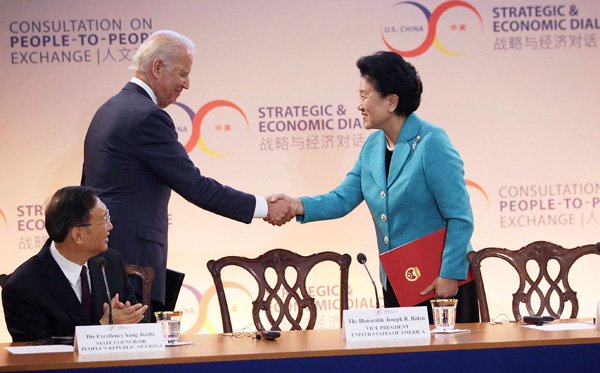Xi: Bilateral ties should be kept on course
Updated: 2015-06-24 04:25
By CHEN WEIHUA in Washington(China Daily)
|
||||||||
 |
|
Vice-Premier Liu Yandong is greeted by US Vice-President Joe Biden as State Councilor Yang Jiechi looks on during the joint opening session of the Strategic and Economic Dialogue, and Consultation on People-to-People Exchange on Tuesday at the State Department in Washington. ALEX WONG/GETTY IMAGES/AFP |
The two nations 'have vast areas over which they can cooperate'
China and the United States should firmly keep their bilateral relationship on the right track, according to a message from President Xi Jinping to be delivered to US President Barack Obama.
Facing a complex and ever-changing global environment, both nations have vast areas over which they should, and can, cooperate, according to the president.
During high-level talks between the two countries on Tuesday, Vice-Premier Liu Yandong quoted Xi as saying that the priority for China's foreign policy is to build a new type of major country relationship with the US based on non-confrontation, non-conflict, mutual cooperation and a win-win principle.
Xi, who is scheduled to pay a state visit to the US in September, said in his message that if the two nations focus on the bilateral relationship, respect and take care of each other's core interests and avoid strategic misunderstanding and miscalculation, their differences can be managed and controlled and common interests can be protected.
Xi's remarks came as the joint opening ceremony was staged in Washington DC for the seventh China-US Strategic and Economic Dialogue and the sixth China-US High-Level Consultation on People-to-People Exchange.
Vice-Premiers Liu and Wang Yang and State Councilor Yang Jiechi attended along with US Vice-President Joe Biden, Secretary of State John Kerry and Secretary of Treasury Jack Lew.
Liu said Xi placed high emphasis on this year's dialogue and consultation and asked her, Wang and Yang to pass his message to Obama.
Biden said, "We don't see eye-to-eye (on certain issues) but we should not stop working hand-in-hand," citing an earlier speech by Xi on the joint relationship that mentioned "casting our eyes to the far horizon".
Biden reiterated the US stance of welcoming China's rise and emphasized the importance of managing areas of disagreements to build a long and sustainable relationship.
He also praised China's contribution in many areas, including climate change, the nuclear issue in the Democratic People's Republic of Korea, China's role in the UN and UN peacekeeping and working with the US to combat the deadly Ebola virus in West Africa.
Kerry, who arrived at the State Department on crutches following his recent bike accident in France, said the US is particularly looking forward to Xi's upcoming visit.
"We are excited about the prospect of cooperation between the two nations," he said, adding that this will help other countries when they see China and the US working together.
While the dialogue and consultation have been hailed by both countries as an effective way to expand cooperation and manage differences, they have also been used to pave the way for fruitful visits by the presidents of the two nations.
In Beijing in November, Xi and Obama reached landmark deals on climate change as well as on visa extensions and military confidence-building.
Ahead of Tuesday's opening ceremony, senior civilian and military officials from the two countries met in Washington on Monday for the fifth China-US Strategic Security Dialogue.
They discussed a host of important issues and exchanged views on strategic and comprehensive security topics of common concern. The Chinese delegation described the talks as being conducted in a "candid, practical and constructive way."
Tao Wenzhao, a senior researcher at the Institute of American Studies at the Chinese Academy of Social Sciences, said both countries have "cooled down" over the South China Sea issue.
Jeffrey Bader, a senior fellow at the Brookings Institution and former special assistant to Obama for national security affairs, said he believed the two countries should engage and cooperate with each other more, and not less as suggested in some quarters.
Wang Xu in Beijing contributed to this story.
chenweihua@chinadailyusa.com

 Turning metal waste into robot-like artwork
Turning metal waste into robot-like artwork
 Man breaks record for being buried alive
Man breaks record for being buried alive
 Ten photos you don't wanna miss - June 24
Ten photos you don't wanna miss - June 24
 Three ships stranded as tropical storm Kujira hits S China
Three ships stranded as tropical storm Kujira hits S China
 Top 10 most valuable Chinese brands of 2015
Top 10 most valuable Chinese brands of 2015
 Ten photos you don't wanna miss - June 23
Ten photos you don't wanna miss - June 23
 The world in photos: June 15-21
The world in photos: June 15-21
 Kris Wu's long legs trigger envy
Kris Wu's long legs trigger envy
Most Viewed
Editor's Picks

|

|

|

|

|

|
Today's Top News
Xi: Bilateral ties should be kept on course
Kerry praises US-China on climate efforts
Liu calls for more 'she power'
Vice-premier calls for more 'she power'
US spied on French presidents, officials, reveals Wikileaks
Australia commits $718m for China-initiated bank
BOC denies illegal activity in Italy
Xi pins high hope for S&ED
US Weekly

|

|






